Latest Sheet Music
Kumiko Noma

opera singer Kumiko Noma and is sung in Latin and Greek, with lyrics extracted from biblical passages,The anime's opening theme song is "Lilium" performed
Traditional

Henry Purcell

Henry Purcell (pronounced /ˈpɜrsəl/; 10 September 1659 (?) – 21 November 1695), was an English organist and Baroque composer of secular and sacred music. Although Purcell incorporated Italian and French stylistic elements into his compositions, his legacy was a uniquely English form of Baroque music.
Bach

Johann Sebastian Bach (31 March 1685 – 28 July 1750) was a German composer and organist whose sacred and secular works for choir, orchestra, and solo instruments drew together the strands of the Baroque period and brought it to its ultimate maturity. Although he introduced no new forms, he enriched the prevailing German style with a robust contrapuntal technique, an unrivalled control of harmonic and motivic organisation in composition for diverse musical forces, and the adaptation of rhythms and textures from abroad, particularly Italy and France.
Revered for their intellectual depth and technical and artistic beauty, Bach's works include the Brandenburg concertos; the Goldberg Variations; the English Suites, French Suites, Partitas, and Well-Tempered Clavier; the Mass in B Minor; the St. Matthew Passion; the St. John Passion; The Musical Offering; The Art of Fugue; the Sonatas and Partitas for violin solo; the Cello Suites; more than 200 surviving cantatas; and a similar number of organ works, including the celebrated Toccata and Fugue in D Minor.
While Bach's fame as an organist was great during his lifetime, he was not particularly well-known as a composer. His adherence to Baroque forms and contrapuntal style was considered "old-fashioned" by his contemporaries, especially late in his career when the musical fashion tended towards Rococo and later Classical styles. A revival of interest and performances of his music began early in the 19th century, and he is now widely considered to be one of the greatest composers in the Western tradition.
Revered for their intellectual depth and technical and artistic beauty, Bach's works include the Brandenburg concertos; the Goldberg Variations; the English Suites, French Suites, Partitas, and Well-Tempered Clavier; the Mass in B Minor; the St. Matthew Passion; the St. John Passion; The Musical Offering; The Art of Fugue; the Sonatas and Partitas for violin solo; the Cello Suites; more than 200 surviving cantatas; and a similar number of organ works, including the celebrated Toccata and Fugue in D Minor.
While Bach's fame as an organist was great during his lifetime, he was not particularly well-known as a composer. His adherence to Baroque forms and contrapuntal style was considered "old-fashioned" by his contemporaries, especially late in his career when the musical fashion tended towards Rococo and later Classical styles. A revival of interest and performances of his music began early in the 19th century, and he is now widely considered to be one of the greatest composers in the Western tradition.
Luigi Boccherini
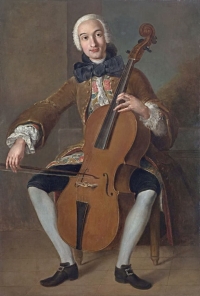
Ridolfo Luigi Boccherini (/ˌbɒkəˈriːni/, also US: /ˌboʊk-/, Italian: (About this soundlisten); 19 February 1743 – 28 May 1805) was an Italian, later Spanish, composer and cellist of the Classical era whose music retained a courtly and galante style even while he matured somewhat apart from the major European musical centers. He is best known for a minuet from his String Quintet in E, Op. 11, No. 5 (G 275), and the Cello Concerto in B flat major (G 482). The latter work was long known in the heavily altered version by German cellist and prolific arranger Friedrich Grützmacher, but has recently been restored to its original version.
Marco Beltrami
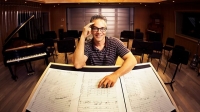
Marco Edward Jonathan Beltrami (born October 7, 1966) is an American composer and conductor of film and television scores. A prolific musician, he has worked in a number of genres, including horror (Mimic, The Faculty, Resident Evil, The Woman in Black, A Quiet Place), action (Terminator 3: Rise of the Machines, Live Free or Die Hard, World War Z), science-fiction (I, Robot, Snowpiercer), Western (3:10 to Yuma, Jonah Hex, The Homesman), and superhero (Hellboy, The Wolverine, Logan).
W.A. Mozart

Wolfgang Amadeus Mozart (German: , full baptismal name Johannes Chrysostomus Wolfgangus Theophilus Mozart (27 January 1756 – 5 December 1791), was a prolific and influential composer of the Classical era. He composed over 600 works, many acknowledged as pinnacles of symphonic, concertante, chamber, piano, operatic, and choral music. He is among the most enduringly popular of classical composers.
Mozart showed prodigious ability from his earliest childhood in Salzburg. Already competent on keyboard and violin, he composed from the age of five and performed before European royalty; at 17 he was engaged as a court musician in Salzburg, but grew restless and traveled in search of a better position, always composing abundantly. While visiting Vienna in 1781, he was dismissed from his Salzburg position. He chose to stay in the capital, where he achieved fame but little financial security. During his final years in Vienna, he composed many of his best-known symphonies, concertos, and operas, and the Requiem. The circumstances of his early death have been much mythologized. He was survived by his wife Constanze and two sons.
Mozart learned voraciously from others, and developed a brilliance and maturity of style that encompassed the light and graceful along with the dark and passionate—the whole informed by a vision of humanity "redeemed through art, forgiven, and reconciled with nature and the absolute." His influence on subsequent Western art music is profound. Beethoven wrote his own early compositions in the shadow of Mozart, of whom Joseph Haydn wrote that "posterity will not see such a talent again in 100 years."
Mozart showed prodigious ability from his earliest childhood in Salzburg. Already competent on keyboard and violin, he composed from the age of five and performed before European royalty; at 17 he was engaged as a court musician in Salzburg, but grew restless and traveled in search of a better position, always composing abundantly. While visiting Vienna in 1781, he was dismissed from his Salzburg position. He chose to stay in the capital, where he achieved fame but little financial security. During his final years in Vienna, he composed many of his best-known symphonies, concertos, and operas, and the Requiem. The circumstances of his early death have been much mythologized. He was survived by his wife Constanze and two sons.
Mozart learned voraciously from others, and developed a brilliance and maturity of style that encompassed the light and graceful along with the dark and passionate—the whole informed by a vision of humanity "redeemed through art, forgiven, and reconciled with nature and the absolute." His influence on subsequent Western art music is profound. Beethoven wrote his own early compositions in the shadow of Mozart, of whom Joseph Haydn wrote that "posterity will not see such a talent again in 100 years."
Bruno Coulais
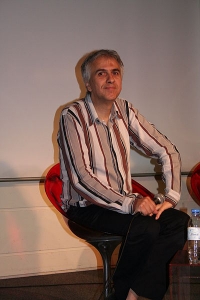
Bruno Coulais (born 13 January 1954) is a French composer, most widely known for his music on film soundtracks. Coulais was born in Paris; his father is from Vendée and his mother is an Iraqi Jew. Coulais recently performed the score for the stop-motion animated film, Coraline, released February 6, 2009.
Tomaso Antonio Vitali
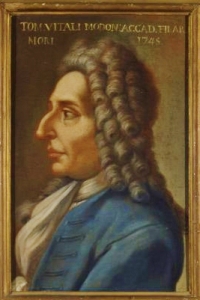
Tomaso Antonio Vitali (March 7, 1663 – May 9, 1745) was an Italian composer and violinist from Bologna, the eldest son of Giovanni Battista Vitali. He is known mainly for a chaconne in G minor for violin and continuo, which was published from a manuscript in the Sächsische Landesbibliothek in Dresden in Die Hoch Schule des Violinspiels (1867) edited by German violinist Ferdinand David. That work's wide-ranging modulations into distant keys have raised speculation that it could not be a genuine baroque work.
Geoffrey O'Hara
Geoffrey O'Hara (February 2, 1882 – January 31, 1967) was a Canadian American composer, singer and music professor.
O'Hara was born in Chatham, Ontario, Canada. He initially planned a military career. O'Hara entered the prestigious Royal Military College of Canada in Kingston, Ontario at age 18 and he trained with the 1st Hussars. He had to abandon his military career upon the death of his father, Robert O'Hara.
He moved to the USA in 1904, the same year he began performing in Vaudeville. He began recording for Edison Records in 1905. In 1913 O'Hara undertook the recording of traditional Indian songs on behalf of the American government. He was recorded on phonograph cylinder lecturing about the complexity of the music as well as singing and playing several types of Navajo traditional songs in 1914. During World War I he was a singing instructor of patriotic songs for American troops. In 1919 he married Constance Dougherty from Massachusetts, and together they had two children; the same year, he became a naturalized citizen of the United States. O'Hara lectured on music and songwriting, and held positions at Teachers' College of Columbia University (1936–37), Huron College and the University of South Dakota, where he later received and honorary Doctor of Music degree in 1947. He lectured for the remainder of his life. In 1920 O'Hara helped organize The Composers' and Lyric Writers' Protective League. He also was a board member of the American Society of Composers, Authors, and Publishers (ASCAP), was the president of the Composers-Authors Guild, and served in the United Service Organizations (USO).
O'Hara was born in Chatham, Ontario, Canada. He initially planned a military career. O'Hara entered the prestigious Royal Military College of Canada in Kingston, Ontario at age 18 and he trained with the 1st Hussars. He had to abandon his military career upon the death of his father, Robert O'Hara.
He moved to the USA in 1904, the same year he began performing in Vaudeville. He began recording for Edison Records in 1905. In 1913 O'Hara undertook the recording of traditional Indian songs on behalf of the American government. He was recorded on phonograph cylinder lecturing about the complexity of the music as well as singing and playing several types of Navajo traditional songs in 1914. During World War I he was a singing instructor of patriotic songs for American troops. In 1919 he married Constance Dougherty from Massachusetts, and together they had two children; the same year, he became a naturalized citizen of the United States. O'Hara lectured on music and songwriting, and held positions at Teachers' College of Columbia University (1936–37), Huron College and the University of South Dakota, where he later received and honorary Doctor of Music degree in 1947. He lectured for the remainder of his life. In 1920 O'Hara helped organize The Composers' and Lyric Writers' Protective League. He also was a board member of the American Society of Composers, Authors, and Publishers (ASCAP), was the president of the Composers-Authors Guild, and served in the United Service Organizations (USO).
Franz Schubert

Franz Peter Schubert (German pronunciation: ; January 31, 1797 – November 19, 1828) was an Austrian composer. He wrote some 600 Lieder, nine symphonies (including the famous "Unfinished Symphony"), liturgical music, operas, some incidental music, and a large body of chamber and solo piano music. He is particularly noted for his original melodic and harmonic writing.
Schubert was born into a musical family, and received formal musical training through much of his childhood. While Schubert had a close circle of friends and associates who admired his work (amongst them the prominent singer Johann Michael Vogl), wide appreciation of his music during his lifetime was limited at best. He was never able to secure adequate permanent employment, and for most of his career he relied on the support of friends and family. He made some money from published works, and occasionally gave private musical instruction. In the last year of his life he began to receive wider acclaim. He died at the age of 31 of "typhoid fever", a diagnosis which was vague at the time; several scholars suspect the real illness was tertiary syphilis.
Interest in Schubert's work increased dramatically in the decades following his death. Composers like Franz Liszt, Robert Schumann and Felix Mendelssohn discovered, collected, and championed his works in the 19th century, as did musicologist Sir George Grove. Franz Schubert is now widely considered to be one of the greatest composers in the Western tradition.
Schubert was born into a musical family, and received formal musical training through much of his childhood. While Schubert had a close circle of friends and associates who admired his work (amongst them the prominent singer Johann Michael Vogl), wide appreciation of his music during his lifetime was limited at best. He was never able to secure adequate permanent employment, and for most of his career he relied on the support of friends and family. He made some money from published works, and occasionally gave private musical instruction. In the last year of his life he began to receive wider acclaim. He died at the age of 31 of "typhoid fever", a diagnosis which was vague at the time; several scholars suspect the real illness was tertiary syphilis.
Interest in Schubert's work increased dramatically in the decades following his death. Composers like Franz Liszt, Robert Schumann and Felix Mendelssohn discovered, collected, and championed his works in the 19th century, as did musicologist Sir George Grove. Franz Schubert is now widely considered to be one of the greatest composers in the Western tradition.
J. S. Bach
Johann Sebastian Bach (21 March 1685, O.S.31 March 1685, N.S. – 28 July 1750, N.S.) was a German composer, organist, harpsichordist, violist, and violinist whose sacred and secular works for choir, orchestra, and solo instruments drew together the strands of the Baroque period and brought it to its ultimate maturity. Although he did not introduce new forms, he enriched the prevailing German style with a robust contrapuntal technique, an unrivalled control of harmonic and motivic organisation, and the adaptation of rhythms, forms and textures from abroad, particularly from Italy and France.
Revered for their intellectual depth, technical command and artistic beauty, Bach's works include the Brandenburg Concertos, the Goldberg Variations, the Partitas, The Well-Tempered Clavier, the Mass in B minor, the St Matthew Passion, the St John Passion, the Magnificat, A Musical Offering, The Art of Fugue, the English and French Suites, the Sonatas and Partitas for solo violin, the Cello Suites, more than 200 surviving cantatas, and a similar number of organ works, including the famous Toccata and Fugue in D minor and Passacaglia and Fugue in C minor, as well as the Great Eighteen Chorale Preludes and Organ Mass.
Bach's abilities as an organist were highly respected throughout Europe during his lifetime, although he was not widely recognised as a great composer until a revival of interest and performances of his music in the first half of the 19th century. He is now generally regarded as one of the main composers of the Baroque style, and as one of the greatest composers of all time.
Revered for their intellectual depth, technical command and artistic beauty, Bach's works include the Brandenburg Concertos, the Goldberg Variations, the Partitas, The Well-Tempered Clavier, the Mass in B minor, the St Matthew Passion, the St John Passion, the Magnificat, A Musical Offering, The Art of Fugue, the English and French Suites, the Sonatas and Partitas for solo violin, the Cello Suites, more than 200 surviving cantatas, and a similar number of organ works, including the famous Toccata and Fugue in D minor and Passacaglia and Fugue in C minor, as well as the Great Eighteen Chorale Preludes and Organ Mass.
Bach's abilities as an organist were highly respected throughout Europe during his lifetime, although he was not widely recognised as a great composer until a revival of interest and performances of his music in the first half of the 19th century. He is now generally regarded as one of the main composers of the Baroque style, and as one of the greatest composers of all time.
Gilbert DeBenedetti
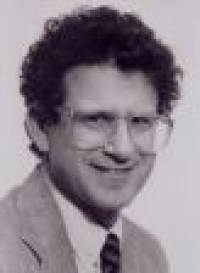
Pittsburgh, Pennsylvania (USA), getting degrees in Music from Carnegie-Mellon University and from the University of Pittsburgh.
Besides arranging music for piano, I have enjoyed teaching Music Theory. I taught that subject at the University of Pittsburgh at Greensburg and at the Pittsburgh High School for Creative and Performing Arts (CAPA). I also have been involved with the Advanced Placement Music Theory Exam, developed and administered by the Educational Testing Service and the College Board.
Besides arranging music for piano, I have enjoyed teaching Music Theory. I taught that subject at the University of Pittsburgh at Greensburg and at the Pittsburgh High School for Creative and Performing Arts (CAPA). I also have been involved with the Advanced Placement Music Theory Exam, developed and administered by the Educational Testing Service and the College Board.
Mago de Oz
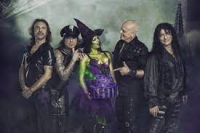
Mägo de Oz (Spanish for Wizard of Oz, with a metal umlaut) are a Spanish folk metal band from Begoña, Madrid formed in mid-1988 by drummer Txus di Fellatio. The band became well known for the strong Celtic feel to their music strengthened through their consistent usage of a violinist and flautist. The name for the band was chosen, according to founding member Txus, because "life is a yellow brick road, on which we walk in the company of others searching for our dreams." On the 26th of October, 2018, the band played a special concert to celebrate their 30th anniversary, playing with a symphony orchestra at the WiZink Center in Madrid.
Schubert

Franz Peter Schubert (January 31, 1797 – November 19, 1828) was an Austrian composer. He wrote some 600 lieder, nine symphonies (including the famous "Unfinished Symphony"), liturgical music, operas, and a large body of chamber and solo piano music. He is particularly noted for his original melodic and harmonic writing.
While Schubert had a close circle of friends and associates who admired his work (including his teacher Antonio Salieri, and the prominent singer Johann Michael Vogl), wider appreciation of his music during his lifetime was limited at best. He was never able to secure adequate permanent employment, and for most of his career he relied on the support of friends and family. Interest in Schubert's work increased dramatically in the decades following his death and he is now widely considered to be one of the greatest composers in the Western tradition.
While he was clearly influenced by the Classical sonata forms of Beethoven and Mozart (his early works, among them notably the 5th Symphony, are particularly Mozartean), his formal structures and his developments tend to give the impression more of melodic development than of harmonic drama. This combination of Classical form and long-breathed Romantic melody sometimes lends them a discursive style: his 9th Symphony was described by Robert Schumann as running to "heavenly lengths". His harmonic innovations include movements in which the first section ends in the key of the subdominant rather than the dominant (as in the last movement of the Trout Quintet). Schubert's practice here was a forerunner of the common Romantic technique of relaxing, rather than raising, tension in the middle of a movement, with final resolution postponed to the very end.
While Schubert had a close circle of friends and associates who admired his work (including his teacher Antonio Salieri, and the prominent singer Johann Michael Vogl), wider appreciation of his music during his lifetime was limited at best. He was never able to secure adequate permanent employment, and for most of his career he relied on the support of friends and family. Interest in Schubert's work increased dramatically in the decades following his death and he is now widely considered to be one of the greatest composers in the Western tradition.
While he was clearly influenced by the Classical sonata forms of Beethoven and Mozart (his early works, among them notably the 5th Symphony, are particularly Mozartean), his formal structures and his developments tend to give the impression more of melodic development than of harmonic drama. This combination of Classical form and long-breathed Romantic melody sometimes lends them a discursive style: his 9th Symphony was described by Robert Schumann as running to "heavenly lengths". His harmonic innovations include movements in which the first section ends in the key of the subdominant rather than the dominant (as in the last movement of the Trout Quintet). Schubert's practice here was a forerunner of the common Romantic technique of relaxing, rather than raising, tension in the middle of a movement, with final resolution postponed to the very end.
Thierry Chauve
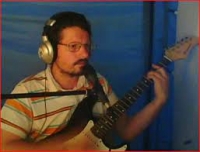
Thierry Chauve Musical artist Record label: Thierry Chauve Albums: Sable Et Corail, Voix Des Anges Songs Le Rappeur Du Futur Le Rappeur Du Futur · 2017 La Poésie 2 Sable Et Corail · 2017 Slam Electro Voix Des Anges · 2017
Harry Gregson-Williams
Harry Gregson-Williams (born 13 December 1961) is a prominent Grammy Award-nominated British composer, orchestrator, conductor, and music producer. He is best known for his film scores, of which he has composed over sixty using electronic music and orchestral pieces. He is also known for his collaborations with director Tony Scott, having scored all his films since the 1998 film Enemy of the State and for composing the music of the Metal Gear games saga. Gregson-Williams is one of the most recognized film score composers and a highly-respected film score composer for his musical style, combining electronic music with orchestral and classic music elements.
Eduardo Rios
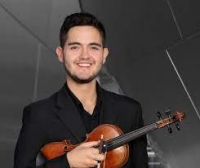
Twenty-one-year old violinist Eduardo Rios is the winner of the 2015 Sphinx Competition. Born and raised in Lima, Peru, Mr. Rios enjoys performing as soloist, chamber musician and orchestra concertmaster. Since his solo debut at age fourteen with the National Symphony Orchestra of Peru, Mr.
Dovid Gabay

Gabay began his musical career at age nineteen, singing at simchos. Since then Gabay has become one of Jewish music's fastest rising stars, ...
Sorairo

Sorairo (ソライロ) is the first single the vocal group Bright released under a major label named Rhythm Zone. The single got weekly the #45 spot on the Oricon ranking and sold 1,630 copies in its first week.
Mischa Elman
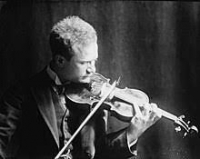
Mischa Elman was a Russian-born American violinist famed for his passionate style, beautiful tone, and impeccable artistry and musicality.
Rachmaninoff

Sergei Vasilievich Rachmaninoff (1 April 1873 - 28 March 1943) was a Russian composer, pianist, and conductor. He was one of the finest pianists of his day and, as a composer, the last great representative of Russian late Romanticism in classical music. Early influences of Tchaikovsky, Rimsky-Korsakov and other Russian composers gave way to a thoroughly personal idiom which included a pronounced lyricism, expressive breadth, structural ingenuity and a tonal palette of rich, distinctive orchestral colors.
Understandably, the piano figures prominently in Rachmaninoff's compositional output, either as a solo instrument or as part of an ensemble. He made it a point, however, to use his own skills as a performer to explore fully the expressive possibilities of the instrument. Even in his earliest works, he revealed a sure grasp of idiomatic piano writing and a striking gift for melody. In some of his early orchestral pieces he showed the first signs of a talent for tone painting, which he would perfect in The Isle of the Dead, and he began to show a similar penchant for vocal writing in two early sets of songs, Opp. 4 and 8. Rachmaninoff's masterpiece, however, is his choral symphony The Bells, in which all of his talents are fused and unified.
Rachmaninoff sometimes felt threatened by the success of modernists such as Scriabin and Prokofiev and wondered whether to cease composing even before he left Russia. His musical philosophy was rooted in the Russian spiritual tradition, where the role of the artist was to create beauty and to speak the truth from the depths of his heart. In his last major interview, in 1941, he admitted his music, like Russian music, was a product of his temperament. He said, on another occasion, "The new kind of music seems to create not from the heart but from the head. Its composers think rather than feel. They have not the capacity to make their works exalt—they meditate, protest, analyze, reason, calculate and brood, but they do not exalt."
Understandably, the piano figures prominently in Rachmaninoff's compositional output, either as a solo instrument or as part of an ensemble. He made it a point, however, to use his own skills as a performer to explore fully the expressive possibilities of the instrument. Even in his earliest works, he revealed a sure grasp of idiomatic piano writing and a striking gift for melody. In some of his early orchestral pieces he showed the first signs of a talent for tone painting, which he would perfect in The Isle of the Dead, and he began to show a similar penchant for vocal writing in two early sets of songs, Opp. 4 and 8. Rachmaninoff's masterpiece, however, is his choral symphony The Bells, in which all of his talents are fused and unified.
Rachmaninoff sometimes felt threatened by the success of modernists such as Scriabin and Prokofiev and wondered whether to cease composing even before he left Russia. His musical philosophy was rooted in the Russian spiritual tradition, where the role of the artist was to create beauty and to speak the truth from the depths of his heart. In his last major interview, in 1941, he admitted his music, like Russian music, was a product of his temperament. He said, on another occasion, "The new kind of music seems to create not from the heart but from the head. Its composers think rather than feel. They have not the capacity to make their works exalt—they meditate, protest, analyze, reason, calculate and brood, but they do not exalt."
Francesco Geminiani
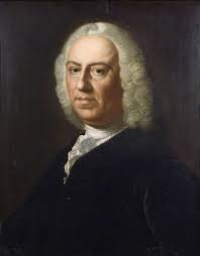
Francesco Saverio Geminiani (baptised 5 December 1687 – 17 September 1762) was an Italian violinist, composer, and music theorist. BBC Radio 3 once described him as "now largely forgotten, but in his time considered almost a musical god, deemed to be the equal of Handel and Corelli."[2
Elpidio Ramírez
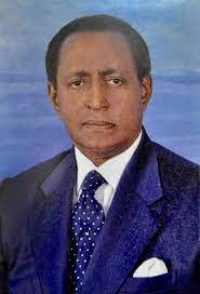
Elpidio Ramírez Burgos, conocido como El Viejo Elpidio (Xoxocapa, Ilamatlán, Veracruz, México, 4 de marzo de 1882-14 de julio de 1960) fue un violinista, compositor, arreglista y revolucionario mexicano. Es considerado precursor del género musical conocido como huapango.
Mozart

Wolfgang Amadeus Mozart, full name Johann Chrysostom Wolfgang Amadeus Mozart (27 January 1756 â 5 December 1791) was a prolific and influential composer of the Classical era. His over 600 compositions include works widely acknowledged as pinnacles of symphonic, concertante, chamber, piano, operatic, and choral music. Mozart is among the most enduringly popular of classical composers, and many of his works are part of the standard concert repertoire.
Mozart's music, like Haydn's, stands as an archetypal example of the Classical style. His works spanned the period during which that style transformed from one exemplified by the style galant to one that began to incorporate some of the contrapuntal complexities of the late Baroque, complexities against which the galant style had been a reaction. Mozart's own stylistic development closely paralleled the development of the classical style as a whole. In addition, he was a versatile composer and wrote in almost every major genre, including symphony, opera, the solo concerto, chamber music including string quartet and string quintet, and the piano sonata. While none of these genres were new, the piano concerto was almost single-handedly developed and popularized by Mozart. He also wrote a great deal of religious music, including masses; and he composed many dances, divertimenti, serenades, and other forms of light entertainment.
The central traits of the classical style can be identified in Mozart's music. Clarity, balance, and transparency are hallmarks of his work.
Mozart's music, like Haydn's, stands as an archetypal example of the Classical style. His works spanned the period during which that style transformed from one exemplified by the style galant to one that began to incorporate some of the contrapuntal complexities of the late Baroque, complexities against which the galant style had been a reaction. Mozart's own stylistic development closely paralleled the development of the classical style as a whole. In addition, he was a versatile composer and wrote in almost every major genre, including symphony, opera, the solo concerto, chamber music including string quartet and string quintet, and the piano sonata. While none of these genres were new, the piano concerto was almost single-handedly developed and popularized by Mozart. He also wrote a great deal of religious music, including masses; and he composed many dances, divertimenti, serenades, and other forms of light entertainment.
The central traits of the classical style can be identified in Mozart's music. Clarity, balance, and transparency are hallmarks of his work.
Rodolphe Kreutzer
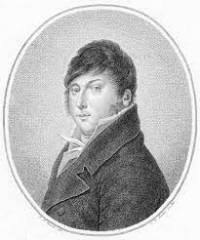
Rodolphe Kreutzer (15 November 1766 – 6 January 1831) was a French violinist, teacher, conductor, and composer of forty French operas, including La mort d'Abel (1810).He is probably best known as the dedicatee of Beethoven's Violin Sonata No. 9, Op. 47 (1803), known as the Kreutzer Sonata, though he never played the work. Kreutzer made the acquaintance of Beethoven in 1798, when at Vienna in the service of the French ambassador, Jean-Baptiste Bernadotte (later King of Sweden and Norway). Beethoven originally dedicated the sonata to George Bridgetower, the violinist at its first performance, but after a quarrel he revised the dedication in favour of Kreutzer.
Debussy

Achille-Claude Debussy (August 22, 1862 – March 25, 1918) was a French composer. Along with Maurice Ravel, he is considered one of the most prominent figures working within the field of Impressionist music, though he himself intensely disliked the term when applied to his compositions. Debussy was not only among the most important of all French composers but also was a central figure in all European music at the turn of the twentieth century.
Debussy's music virtually defines the transition from late-Romantic music to twentieth century modernist music. In French literary circles, the style of this period was known as Symbolism, a movement that directly inspired Debussy both as a composer and as an active cultural participant.
Debussy's music virtually defines the transition from late-Romantic music to twentieth century modernist music. In French literary circles, the style of this period was known as Symbolism, a movement that directly inspired Debussy both as a composer and as an active cultural participant.
JerryC

JerryC (Chinese: 張逸帆; pinyin: Zhāng Yìfān; born 31 August 1981), also known by his English name Jerry Chang, is a Taiwanese guitarist and composer. He is known for arranging and playing "Canon Rock", a rock arrangement of Johann Pachelbel's Canon in D. He began playing the guitar at the age of 17, and the piano before age 15. His style is influenced by classical music, neoclassical guitarists, as well as metal bands such as Helloween and Metallica and Japanese rock bands such as B'z and L'Arc-en-Ciel.
César Franck
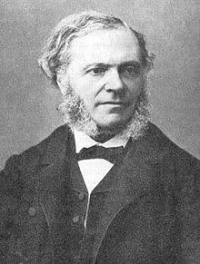
César-Auguste-Jean-Guillaume-Hubert Franck was a composer, pianist, organist, and music teacher who worked in Paris during his adult life. He was born at Liège, in what is now Belgium. He gave his first concerts there in 1834 and studied privately in Paris from 1835, where his teachers included Anton Reicha.
Michel Farinel
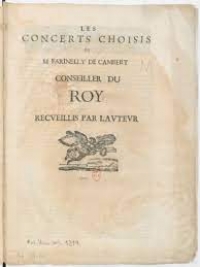
Michel Farinel is a French violinist and composer born in Grenoble. May 23, 1649, active in France and abroad during the period 1670-1710 and died at La Tronche. June 18, 1726.
Birth certificate of Michel Farinel (1649-1726). AD Isere.His print autobiography was added to a manuscript collection of his works, which resurfaced in 1997 1 ; makes it possible to trace a highly complex route in various European countries.
His grandfather, Gabriel Farinel , was an aide and died in 1596, probably of the plague. His son Robert was later introduced to music by an uncle and introduced to the court of Savoy. She worked in Turin from about 1635 until 1646 for Christine of France, Duchess of Savoy, to be cited under the name Roberto Farinelli detto il piccolo. There he studied with his brother Francesco Farinello detto il grande, a musician attached to the Savoy court until the end of his life (1674) and father of two musicians named Agostino and Stefano.
Birth certificate of Michel Farinel (1649-1726). AD Isere.His print autobiography was added to a manuscript collection of his works, which resurfaced in 1997 1 ; makes it possible to trace a highly complex route in various European countries.
His grandfather, Gabriel Farinel , was an aide and died in 1596, probably of the plague. His son Robert was later introduced to music by an uncle and introduced to the court of Savoy. She worked in Turin from about 1635 until 1646 for Christine of France, Duchess of Savoy, to be cited under the name Roberto Farinelli detto il piccolo. There he studied with his brother Francesco Farinello detto il grande, a musician attached to the Savoy court until the end of his life (1674) and father of two musicians named Agostino and Stefano.
Johann Sebastian Bach

Johann Sebastian Bach (31 March 1685 – 28 July 1750) was a German composer and musician of the Baroque period. He is known for instrumental compositions such as the Art of Fugue, the Brandenburg Concertos, and the Goldberg Variations, and for vocal music such as the St Matthew Passion and the Mass in B minor. Since the 19th-century Bach Revival he has been generally regarded as one of the greatest composers of the Western art musical canon.
Nobuo Uematsu

Nobuo Uematsu (植松伸夫 Uematsu Nobuo?, born March 21, 1959) is a Japanese video game composer and musician, best known for scoring the majority of titles in the Final Fantasy series. He is regarded as one of the most famous and respected composers in the video game community. Uematsu is a self-taught musician; he began to play the piano at the age of eleven or twelve, with Elton John as his biggest influence.
Uematsu joined Square (later Square Enix) in 1985, where he met Final Fantasy creator Hironobu Sakaguchi. They have worked together on numerous titles, most notably the games in the Final Fantasy series. After nearly 20 years in the company, he left Square Enix in 2004 and founded his own company called Smile Please, as well as the music production company Dog Ear Records. He has since composed music as a freelancer for video games primarily developed by Square Enix and Sakaguchi's development studio Mistwalker.
A handful of soundtracks and arranged albums of Uematsu's game scores have been released. Pieces from his video game works have been performed in concerts worldwide, and numerous Final Fantasy concerts have also been held. He has worked with Grammy Award-winning conductor Arnie Roth on several of these concerts. In 2002, he formed a rock band with colleagues Kenichiro Fukui and Tsuyoshi Sekito called The Black Mages, in which Uematsu plays the keyboard. The band plays arranged rock versions of Uematsu's Final Fantasy compositions.
Uematsu joined Square (later Square Enix) in 1985, where he met Final Fantasy creator Hironobu Sakaguchi. They have worked together on numerous titles, most notably the games in the Final Fantasy series. After nearly 20 years in the company, he left Square Enix in 2004 and founded his own company called Smile Please, as well as the music production company Dog Ear Records. He has since composed music as a freelancer for video games primarily developed by Square Enix and Sakaguchi's development studio Mistwalker.
A handful of soundtracks and arranged albums of Uematsu's game scores have been released. Pieces from his video game works have been performed in concerts worldwide, and numerous Final Fantasy concerts have also been held. He has worked with Grammy Award-winning conductor Arnie Roth on several of these concerts. In 2002, he formed a rock band with colleagues Kenichiro Fukui and Tsuyoshi Sekito called The Black Mages, in which Uematsu plays the keyboard. The band plays arranged rock versions of Uematsu's Final Fantasy compositions.
Johann Strauss

Johann Strauss I (March 14, 1804 – September 25, 1849; German: Johann Baptist Strauß, Johann Strauss (Vater); also Johann Baptist Strauss, Johann Strauss, Sr., the Elder, the Father), born in Vienna, was an Austrian Romantic composer famous for his waltzes, and for popularizing them alongside Joseph Lanner, thereby setting the foundations for his sons to carry on his musical dynasty. His most famous piece is probably the Radetzky March (named after Joseph Radetzky von Radetz), while his most famous waltz is probably the Lorelei Rheinklänge, Op. 154.
Pedro Laurenz
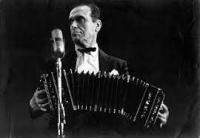
Pedro Laurenz was a bandoneon player, director and composer of Argentine tango music. He was born on October 10, 1902, and died on July 7, 1972. Pedro was born into a musical family in the La Boca neighbourhood of Buenos Aires and later moving to Uruguay, where he was attracted to the bandoneón.
Vivaldi

Antonio Lucio Vivaldi (March 4, 1678 â July 28, 1741), nicknamed il Prete Rosso ("The Red Priest"), was a Venetian priest and Baroque music composer, as well as a famous virtuoso violinist; he was born and raised in the Republic of Venice. The Four Seasons, a series of four violin concerti, is his best-known work and a highly popular Baroque piece.
Many of Vivaldi's compositions reflect a flamboyant, almost playful, exuberance. Most of Vivaldi's repertoire was rediscovered only in the first half of the 20th century in Turin and Genoa and was published in the second half. Vivaldi's music is innovative, breaking a consolidated tradition in schemes; he gave brightness to the formal and the rhythmic structure of the concerto, repeatedly looking for harmonic contrasts and innovative melodies and themes. Moreover, Vivaldi was able to compose nonacademic music, particularly meant to be appreciated by the wide public and not only by an intellectual minority. The joyful appearance of his music reveals in this regard a transmissible joy of composing; these are among the causes of the vast popularity of his music. This popularity soon made him famous in other countries such as France which was, at the time, very independent concerning its musical taste.
Vivaldi is considered one of the composers who brought Baroque music (with its typical contrast among heavy sonorities) to evolve into a classical style. Johann Sebastian Bach was deeply influenced by Vivaldi's concertos and arias (recalled in his Johannes Passion, Matthäuspassion, and cantatas). Bach transcribed a number of Vivaldi's concerti for solo keyboard, along with a number for orchestra, including the famous Concerto for Four Violins and Violoncello, Strings and Continuo (RV 580).
Many of Vivaldi's compositions reflect a flamboyant, almost playful, exuberance. Most of Vivaldi's repertoire was rediscovered only in the first half of the 20th century in Turin and Genoa and was published in the second half. Vivaldi's music is innovative, breaking a consolidated tradition in schemes; he gave brightness to the formal and the rhythmic structure of the concerto, repeatedly looking for harmonic contrasts and innovative melodies and themes. Moreover, Vivaldi was able to compose nonacademic music, particularly meant to be appreciated by the wide public and not only by an intellectual minority. The joyful appearance of his music reveals in this regard a transmissible joy of composing; these are among the causes of the vast popularity of his music. This popularity soon made him famous in other countries such as France which was, at the time, very independent concerning its musical taste.
Vivaldi is considered one of the composers who brought Baroque music (with its typical contrast among heavy sonorities) to evolve into a classical style. Johann Sebastian Bach was deeply influenced by Vivaldi's concertos and arias (recalled in his Johannes Passion, Matthäuspassion, and cantatas). Bach transcribed a number of Vivaldi's concerti for solo keyboard, along with a number for orchestra, including the famous Concerto for Four Violins and Violoncello, Strings and Continuo (RV 580).
Fullmetal Alchemist
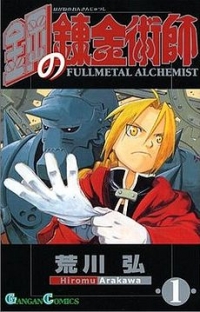
Fullmetal Alchemist (鋼の錬金術師 Hagane no Renkinjutsushi?, literally "Alchemist of Steel"), is an ongoing Japanese manga series written and illustrated by Hiromu Arakawa. The world of Fullmetal Alchemist is styled after the European Industrial Revolution. Set in a fictional universe in which alchemy is one of the most advanced scientific techniques known to man, the story follows the brothers Edward and Alphonse Elric, who want to restore their bodies after a disastrous failed attempt to bring their mother back to life through alchemy.
The manga is serialized in Square Enix's Monthly Shōnen Gangan magazine (starting August 2001) and currently has 24 tankōbon volumes. It was adapted into an animated television series of 51 episodes by Bones from October 4, 2003 to October 2, 2004, later followed by a film sequel that concluded the story of the anime. Fullmetal Alchemist would later spawn a second series called Fullmetal Alchemist: Brotherhood, which first premiered in Japan on April 5, 2009. A multitude of spin-off novels, original video animations (OVAs), drama CDs, soundtracks, and video games have been adapted from the series. A collectible card game, multiple supplementary books, and a variety of action figures and other merchandise based on the characters of the series have also been released.
The manga has been licensed by Viz Media for publication in the United States, with twenty-two bound volumes released currently. Although there are no major differences with the Japanese version, some pages have been edited to avoid minor references to western theology. Funimation Entertainment has dubbed the anime episodes in the United States and Canada, and has also released them in all English-speaking DVD regions. The English version of the film premiered in a limited number of U.S. theaters on August 25, 2006 and was later released on DVD. Funimation and Destineer have also been releasing the video games from the series.
In Japan, the Fullmetal Alchemist manga has had good sales with over 30 million volumes sold as of 2008. The English release of the manga's first volume was the top-selling graphic novel during the year 2005. In two TV Asahi web polls, the anime was voted #1 most popular anime of all time in Japan. It was nominated in six of the eight categories for which it was eligible at the American Anime Awards in February 2007, winning awards in five of them. Reviewers from several media generally had positive comments on the series.
The manga is serialized in Square Enix's Monthly Shōnen Gangan magazine (starting August 2001) and currently has 24 tankōbon volumes. It was adapted into an animated television series of 51 episodes by Bones from October 4, 2003 to October 2, 2004, later followed by a film sequel that concluded the story of the anime. Fullmetal Alchemist would later spawn a second series called Fullmetal Alchemist: Brotherhood, which first premiered in Japan on April 5, 2009. A multitude of spin-off novels, original video animations (OVAs), drama CDs, soundtracks, and video games have been adapted from the series. A collectible card game, multiple supplementary books, and a variety of action figures and other merchandise based on the characters of the series have also been released.
The manga has been licensed by Viz Media for publication in the United States, with twenty-two bound volumes released currently. Although there are no major differences with the Japanese version, some pages have been edited to avoid minor references to western theology. Funimation Entertainment has dubbed the anime episodes in the United States and Canada, and has also released them in all English-speaking DVD regions. The English version of the film premiered in a limited number of U.S. theaters on August 25, 2006 and was later released on DVD. Funimation and Destineer have also been releasing the video games from the series.
In Japan, the Fullmetal Alchemist manga has had good sales with over 30 million volumes sold as of 2008. The English release of the manga's first volume was the top-selling graphic novel during the year 2005. In two TV Asahi web polls, the anime was voted #1 most popular anime of all time in Japan. It was nominated in six of the eight categories for which it was eligible at the American Anime Awards in February 2007, winning awards in five of them. Reviewers from several media generally had positive comments on the series.
Dietrich Buxtehude
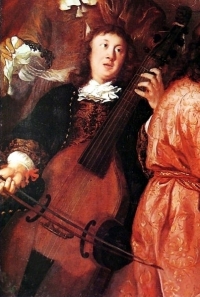
Dieterich Buxtehude (German: ; Danish: Diderich, pronounced ; c. 1637/39 – 9 May 1707) was a Danish-German organist and composer of the Baroque period. His organ works represent a central part of the standard organ repertoire and are frequently performed at recitals and in church services. He composed in a wide variety of vocal and instrumental idioms, and his style strongly influenced many composers, including Johann Sebastian Bach, his student. Today, Buxtehude is considered one of the most important composers in Germany of the mid-Baroque.
Pei-da, Jin
Peter Kam Pui-Tat is a music composer for Hong Kong films including The Warlords, Bodyguards and Assassins and Dragon. Kam is an eight-time winner at the Hong Kong Film Awards.
luciano gallet
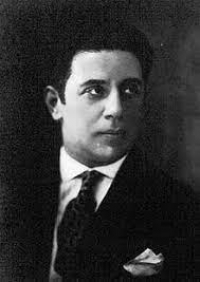
Luciano Gallet was a Brazilian composer, conductor and pianist. He began piano playing as a school boy, and first studied and graduated in architecture, before enrolling at the Instituto Nacional de Música to study music with Henrique Oswald, Abdon Milanez and Agnelo França
Paolo Mora
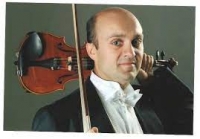
Violinist in Teatro Comunale di Bologna, he studied in conservatorio "Arrigo Boito" in Parma . He won several important violin competitions such as Perosi in Biella and for important lyrical orchestras(Arena di Verona and Teatro Comunale in Bologna). He has been dedicated on composition and arrangements since 2004: he orchestrated the Concert n.6 for violin and orchestra by Niccolò Paganini (from the manuscript for guitar and violin) and others arrangements for string quartet for "L'Oca del Cairo" editions.
K-ON
K-On! (Japanese: けいおん!, Hepburn: Keion!) is a Japanese four-panel manga written and illustrated by Kakifly. It was serialized in Houbunsha's monthly seinen manga magazine Manga Time Kirara between the May 2007 and October 2010 issues. It was also serialized in Houbunsha's magazine Manga Time Kirara Carat. The manga relaunched from April 2011 to June 2012 with two separate storylines published in Manga Time Kirara and Manga Time Kirara Carat. The manga is licensed in North America by Yen Press. A spin-off manga about a different band of high school girls, K-On! Shuffle, began serialization in July 2018.
Robert Hu
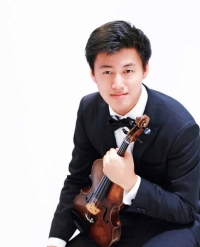
Robert Hu Musical artist Genre: Pop Songs Apricity Apricity · 2021 What about me? What about me? · 2021 Honey Latte
Honey Latte · 2021
Honey Latte · 2021
Karl Jenkins
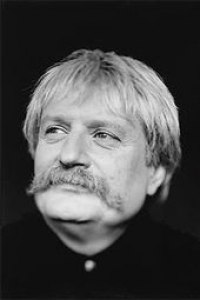
Karl William Pamp Jenkins, CBE (born 17 February 1944) is a Welsh musician and composer.
Jean-Baptiste Lully
Jean-Baptiste Lully (UK: /ˈlʊli/, US: /luːˈliː/; French: ; born Giovanni Battista Lulli, Italian: ; 28 November 1632 – 22 March 1687) was an Italian-born French composer, instrumentalist, and dancer who is considered a master of the French Baroque music style. Best known for his operas, he spent most of his life working in the court of Louis XIV of France and became a French subject in 1661.
Astor Piazzolla

Ástor Pantaleón Piazzolla (March 11, 1921 – July 4, 1992) was an Argentine tango composer and bandoneón player. His oeuvre revolutionized the traditional tango into a new style termed nuevo tango, incorporating elements from jazz and classical music. An excellent bandoneonist, he regularly performed his own compositions with different ensembles.
Piazzolla's nuevo tango was distinct from the traditional tango in its incorporation of elements of jazz, its use of extended harmonies and dissonance, its use of counterpoint, and its ventures into extended compositional forms. As Argentine psychoanalyst Carlos Kuri has pointed out, Piazzolla's fusion of tango with this wide range of other recognizable Western musical elements was so successful that it produced a new individual style transcending these influences. It is precisely this success, and individuality, that makes it hard to pin down where particular influences reside in his compositions, but some aspects are clear. The use of the passacaglia technique of a circulating bass line and harmonic sequence, invented and much used in 17th and 18th century baroque music but also central to the idea of jazz "changes", predominates in most of Piazzolla's mature compositions. Another clear reference to the baroque is the often complex and virtuosic counterpoint that sometimes follows strict fugal behavior but more often simply allows each performer in the group to assert his voice. A further technique that emphasises this sense of democracy and freedom among the musicians is improvisation that is borrowed from jazz in concept, but in practice involves a different vocabulary of scales and rhythms that stay within the parameters of the established tango sound-world. Pablo Ziegler has been particularly responsible for developing this aspect of the style both within Piazzolla's groups and since the composer's death.
Piazzolla's nuevo tango was distinct from the traditional tango in its incorporation of elements of jazz, its use of extended harmonies and dissonance, its use of counterpoint, and its ventures into extended compositional forms. As Argentine psychoanalyst Carlos Kuri has pointed out, Piazzolla's fusion of tango with this wide range of other recognizable Western musical elements was so successful that it produced a new individual style transcending these influences. It is precisely this success, and individuality, that makes it hard to pin down where particular influences reside in his compositions, but some aspects are clear. The use of the passacaglia technique of a circulating bass line and harmonic sequence, invented and much used in 17th and 18th century baroque music but also central to the idea of jazz "changes", predominates in most of Piazzolla's mature compositions. Another clear reference to the baroque is the often complex and virtuosic counterpoint that sometimes follows strict fugal behavior but more often simply allows each performer in the group to assert his voice. A further technique that emphasises this sense of democracy and freedom among the musicians is improvisation that is borrowed from jazz in concept, but in practice involves a different vocabulary of scales and rhythms that stay within the parameters of the established tango sound-world. Pablo Ziegler has been particularly responsible for developing this aspect of the style both within Piazzolla's groups and since the composer's death.
Elliot Corner
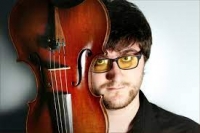
Elliot Corner is an award-winning Violist and music teacher, who graduated from the Royal College of Music, London with a BMus(Hons) in Viola Performance. He studied there as a Foundation Scholar with two professors, Simon Rowland-Jones and Susie Meszaros., Elliot also participated in several masterclasses and received tuition from some internationally notable musicians including Jennifer Stumm, Jan Repko, Alina Ibragimova and Richard Lester.
Mikhail Glinka
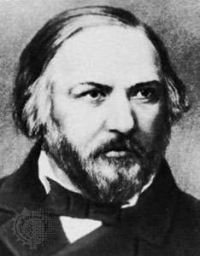
Mikhail Ivanovich Glinka (Russian: Михаи́л Ива́нович Гли́нка, tr. Mikhaíl Ivánovich Glínka, IPA: (About this soundlisten); 1 June 1804 – 15 February 1857) was the first Russian composer to gain wide recognition within his own country, and is often regarded as the fountainhead of Russian classical music. Glinka's compositions were an important influence on future Russian composers, notably the members of The Five, who took Glinka's lead and produced a distinctive Russian style of music.
Dean Marshall
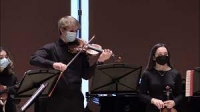
Dean Marshall Musical artist Songs If I Was the Only Girl in the World Avec Amour · 2021 Morning Mood Avec Amour · 2021 Close to You Avec Amour · 2021 Ah! So Pure Avec Amour · 2021 Bright Eyes Avec Amour · 2021 I Left My Heart in Sanfransisco Avec Amour · 2021 If Avec Amour · 2021 Big Spender Avec Amour · 2021.
John Rzeznik
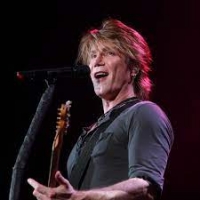
John Joseph Theodore Rzeznik, often known as Johnny Rzeznik, is an American musician, singer-songwriter, and producer. Rzeznik is best known as the guitarist and frontman of the rock band the Goo Goo Dolls, of which he is a founding member and with whom he has recorded twelve studio albums.
Saint-Preux
Saint-Preux (born 1950) is a French composer of contemporary classical music which also combines elements from popular music and electronic music. His real name is Christian Saint-Preux Langlade. By 1968 he had already released several 45 rpm recordings of his compositions, including Une étrange musique (A Strange Music) which reached #71 on the French charts that year. In August 1969, he took part in Poland's Sopot International Song Festival with his first major composition La valse de l'enfance (The Waltz of Youth). The song was Luxembourg's entry in the festival and was sung by Henri Seroka with Saint-Preux conducting the symphony orchestra. The song won the Grand Prix de la Presse award at the festival and was released in that same year on Seroka (Festival FX 1583) and as a single on the EMI/Odeon label. While in Poland he composed what was to become his biggest hit, Concerto pour une Voix (Concerto for One Voice).
